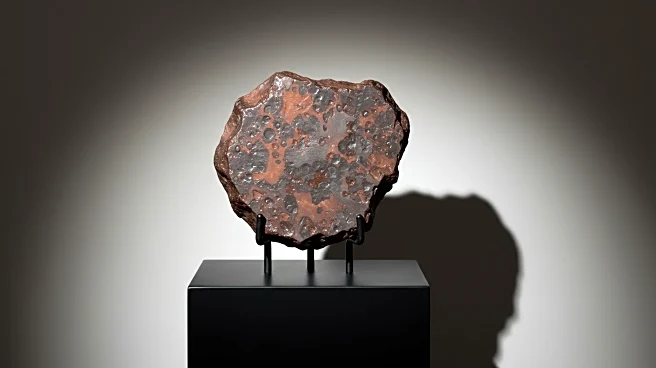What's Happening?
Niger has launched an investigation into the sale of a rare Martian meteorite, known as NWA 16788, which was auctioned for $5.3 million at Sotheby's in New York. The meteorite, discovered in Niger's Agadez region in 2023, is the largest piece of Mars found on Earth, weighing 54 pounds. The Nigerien government is questioning the legality of its export, likening the situation to illicit international trafficking. The investigation involves multiple ministries, including mines, security, higher education, and justice, aiming to uncover details about the meteorite's discovery and sale. Sotheby's claims the meteorite was exported following international procedures, but Niger lacks specific legislation on meteorites.
Why It's Important?
The investigation highlights the complexities surrounding the ownership and trade of space rocks, which are considered valuable for scientific research and cultural significance. The sale of Martian meteorites, which are rare and provide insights into the solar system, raises questions about balancing private ownership with scientific accessibility. The outcome of Niger's investigation could influence international policies on the trade and ownership of meteorites, impacting collectors, museums, and researchers globally. The case underscores the need for clear regulations to ensure that scientific and cultural interests are protected.
What's Next?
Niger's investigation may lead to the development of specific legislation regarding meteorite ownership and export. The findings could prompt international discussions on the regulation of space rock trade, potentially affecting future auctions and private collections. Stakeholders, including governments, scientific communities, and collectors, may need to navigate new legal frameworks to ensure compliance and protect interests. The investigation's outcome could set precedents for other countries dealing with similar issues.
Beyond the Headlines
The discourse around the meteorite sale sheds light on broader issues of ownership and access to extraterrestrial materials. As space exploration advances, the legal and ethical dimensions of owning and trading space rocks become increasingly significant. The case may influence how countries approach the management of natural resources from space, balancing economic interests with scientific and cultural preservation.









